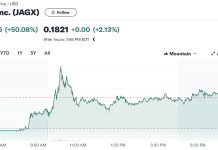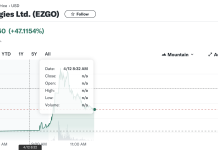Trending Now
Fidelity Canada Adds Bitcoin Exposure to EFTs
The Canadian branch of the investments management firm, Fidelity Investments, will allocate a part of Bitcoin exposure to its All-in-One Balanced ETF and All-in-one...
Oragenics Positions ONP-002 as Potential First-Ever Pharmacological Treatment for Concussion in...
Oragenics, Inc. (NYSE American: OGEN), a clinical-stage biotechnology company developing brain-targeted therapeutics through proprietary intranasal delivery technology, has laid out an ambitious...
Warren Buffett Might Be Trimming His Apple Holdings Again — And...
If you've been following Warren Buffett's moves lately, you might have noticed something interesting buried in Berkshire...
CRYPTO NEWS
Exit Scams Disrupting Darknet Marketplaces As Jack Ma Praises Disruptive Nature...
A recent report from blockchain forensic company CipherTrace has demonstrated the massive disruptions to the underground darknet marketplace after the recent wave of exit...
TRENDING
LATEST REVIEWS
Maps.Me Raises $50 Million To Embed Decentralized Finance Protocols On Its...
Offline travel and mapping application Maps.Me which boasts over 140 million users globally has raised $50 million to integrate decentralized finance (DeFi)...
Hot Of the Press
Great Times Ahead For Crypto Wallets And Exchanges After Google Eases...
It will be a new dawn for all the advertisers that offer Cryptocurrency Exchanges and Wallets if they conform to Google's set requirements. Alphabet...
STOCK NEWS
Ebang Expresses Interest To Acquire New Zealand Firm For Setting Up Digital Asset Financial...
Chinese Bitcoin mining equipment supplier, Ebang International Holdings Inc. (NASDAQ:EBON) has announced the signing of an Expression of Interest Tender Letter for the acquisition...
Indian Cryptocurrency Exchange, BuyUCoin Leads Industry Players In Developing Framework To Regulate Industry
Following rumors that there will be a second cryptocurrency ban in India, a major crypto exchange BuyUcoin has come up with a framework of...
Mastercard Inc (NYSE: MA) Announces That it Will Directly Support Cryptocurrency
Mastercard Inc (NYSE: MA) has recently authorized the direct usage of cryptocurrencies on its platform. This move creates effective means for financial institutions functioning...
The Dapp List Completes $1.9 Million Funding Round To Help In Tackling Fraudulent Projects
The Dapp List, which focuses on rooting out scam projects, has finalized a $1.9 million funding round. The Web3 curating multi-chain ecosystem will use...
EZGO Technologies Ltd (NASDAQ: EZGO) Advances in Smart Transportation with New $1.84 Million Security...
In a strategic move to bolster its presence in the smart transportation sector, EZGO Technologies Ltd. (Nasdaq: EZGO), a trailblazer in short-distance...

















































